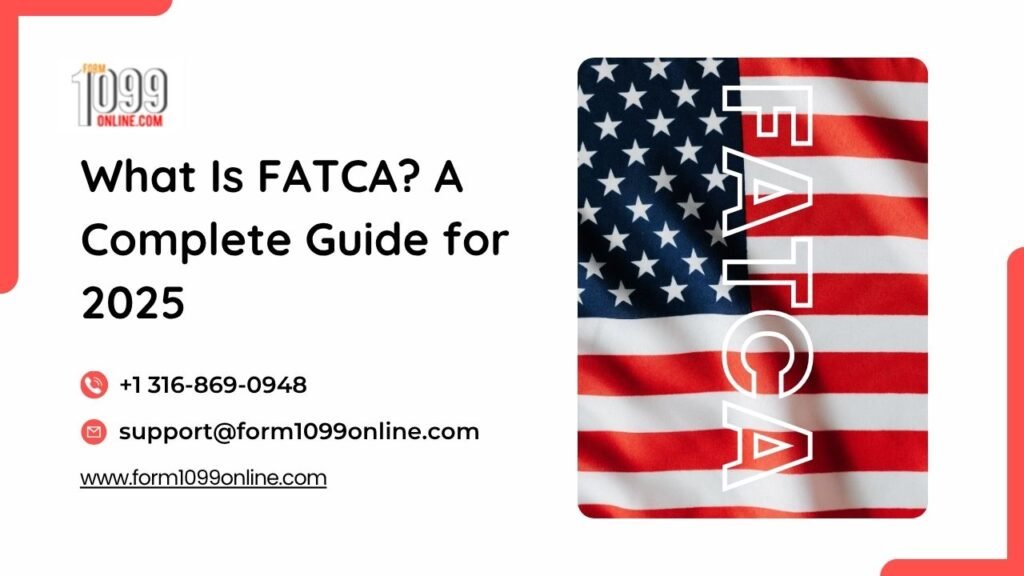As global financial transparency becomes more critical, the Foreign Account Tax Compliance Act (FATCA) continues to play a pivotal role in how U.S. taxpayers and foreign financial institutions report and manage offshore assets. Enforced by the IRS, FATCA is designed to combat tax evasion and ensure proper reporting of income earned abroad.
In this guide, we’ll walk you through everything you need to know about FATCA in 2025—from its purpose and key requirements to compliance strategies, penalties. Read more IRS updates at Form1099Online Blogs.
Table of Contents
What Is FATCA?
FATCA is a U.S. federal law enacted in 2010 and implemented globally from July 1, 2014. Its main goal is to identify and prevent U.S. taxpayers from hiding money in foreign bank accounts and offshore investments.
Under FATCA, foreign financial institutions (FFIs) are required to report information about accounts held by U.S. taxpayers or foreign entities with substantial U.S. ownership to the IRS. In turn, U.S. individuals with foreign financial assets must report them annually using Form 8938, filed along with their income tax return.
Who Does FATCA Apply To?
FATCA applies to two main groups:
1. U.S. Taxpayers with Foreign Assets
If you are a U.S. citizen, resident alien, or green card holder and you hold foreign financial assets exceeding certain thresholds, you are required to report them under FATCA.
Reporting thresholds (as of 2025):
- Single filers living in the U.S.: Assets > $50,000 (end of year) or > $75,000 (anytime during the year).
- Married filing jointly in the U.S.: Assets > $100,000 (end of year) or > $150,000 (anytime).
- Taxpayers living abroad: Higher thresholds apply (e.g., $200,000 for single filers).
2. Foreign Financial Institutions (FFIs)
These include:
- Banks and credit unions
- Investment funds
- Insurance companies
- Hedge funds
They must:
- Identify and document U.S. account holders
- Report information to the IRS or the relevant local authority (based on intergovernmental agreements)
Key Forms Related to FATCA
| Form | Purpose |
| Form 8938 | Used by U.S. individuals to report specified foreign financial assets |
| Form W-9 | Provided by U.S. persons to FFIs for identification |
| Form W-8BEN | Used by non-U.S. persons to certify foreign status |
| Form 8966 | Filed by FFIs to report U.S. accounts to the IRS |
| Form 1042-S | Reports U.S.-source income paid to foreign persons |
FATCA & Global Cooperation
FATCA is supported by Intergovernmental Agreements (IGAs) between the U.S. and more than 110 countries, including Canada, the UK, India, Australia, and most EU nations. These agreements ensure that foreign institutions report U.S. account information directly to their local tax authority, which then shares it with the IRS.
FATCA vs. FBAR: What’s the Difference?
While both FATCA and FBAR involve the reporting of foreign assets, they have different filing requirements.
| Feature | FATCA (Form 8938) | FBAR (FinCEN Form 114) |
| Filed with | IRS tax return | FinCEN (separate from IRS) |
| Thresholds | Higher | $10,000 total value |
| Assets covered | Broader range | Only financial accounts |
Note: You may be required to file both FATCA and FBAR depending on your financial situation.
FATCA Non-Compliance Penalties
Failing to comply with FATCA can lead to serious consequences:
- Failure to file Form 8938: $10,000 penalty; additional $10,000 per 30 days (up to $50,000 total)
- Failure to disclose assets: May trigger IRS audits or criminal charges
- FFI non-compliance: 30% withholding tax on U.S.-source payments
FATCA Filing Tips for 2025
- Keep detailed records of all foreign financial accounts and assets.
- Review thresholds annually, as filing requirements may change based on your location and status.
- File Form 8938 on time with your IRS income tax return (due April 15, with extensions available).
- Use trusted tax professionals for complex foreign reporting.
2025 FATCA Updates to Watch
As of 2025, there are no major overhauls to FATCA, but here are some important ongoing updates:
- Increased international data sharing under IGAs
- More scrutiny on cryptocurrency accounts held abroad
- Enhanced compliance checks for digital financial institutions
- IRS automation tools to flag underreported offshore income
Conclusion
FATCA continues to serve as a powerful tool in the fight against offshore tax evasion. For U.S. taxpayers and foreign institutions alike, compliance is not optional. Staying informed and filing the right forms—like Form 8938—can help you avoid hefty penalties and ensure peace of mind during tax season.
If you have foreign assets or manage cross-border finances, 2025 is the year to get FATCA-smart and protect your global financial interests.
FAQs About FATCA
Q1. Do I need to file FATCA if I live outside the U.S.?
Yes, if you are a U.S. citizen or resident alien and your foreign assets exceed the reporting threshold, you must file Form 8938, even if you live abroad.
Q2. What if my foreign assets are held jointly with a non-U.S. spouse?
You still need to report your share of the jointly held assets under FATCA.
Q3. Can FATCA apply to cryptocurrency accounts?
Yes, if your crypto assets are held with foreign exchanges or financial entities, FATCA reporting may apply.
Q4. Is FATCA still in effect in 2025?
Absolutely. FATCA remains active and is increasingly enforced worldwide.
Q5. What’s the difference between FATCA and FBAR?
FATCA requires filing Form 8938 with your tax return, while FBAR is a separate filing to FinCEN. They have different thresholds and asset coverage.

